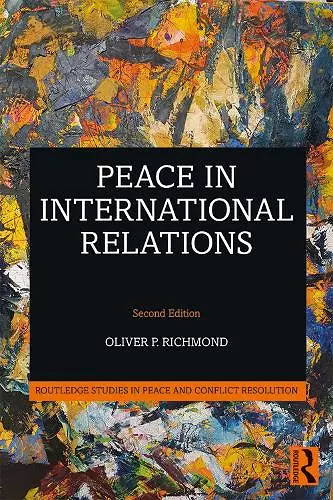Peace in International Relations
Format:Paperback
Publisher:Taylor & Francis Inc
Published:21st Jan '20
Currently unavailable, and unfortunately no date known when it will be back
This paperback is available in another edition too:
- Hardback£145.00(9780815356790)

This updated and revised second edition examines the conceptualisation and evolution of peace in International Relations (IR) theory.
The book examines the concept of peace and its usage in the main theoretical debates in IR, including realism, liberalism, constructivism, critical theory, and post-structuralism, as well as in the more direct debates on peace and conflict studies. It explores themes relating to culture, development, agency, and structure, not just in terms of representations of IR, and of peace, but in terms of the discipline of IR itself. The work also specifically explores the recent mantras associated with liberal and neoliberal versions of peace, which appear to have become foundational for much of the mainstream literature and for doctrines for peace and development in the policy world. Analysing war has often led to the dominance – and mitigation – of violence as a basic assumption in, and response to, the problems of IR. This study aims to redress this negative balance by arguing that the discipline offers a rich basis for the study of peace, which has advanced significantly over the last century or so. It also proposes innovative theoretical dimensions of the study of peace, with new chapters discussing post-colonial and digital developments.
This book will be of great interest to students of peace and conflict studies, politics, and IR.
Praise for second edition
'A study that critically reflects on post-liberal agendas for peace is a welcome contribution to efforts aimed at disrupting long-settled, quite obsolete and generally stale liberal peace-inspired thinking about peace in a changing world. This book provides ways in which we might think about post-liberal ways to lasting, fair and just peace. It engenders a shift in paradigm from thinking about a way to peace to reflecting on ways to peace. It should be a great read for emerging students on peace students and established scholars seeking fresh perspectives alike.'-- Prof. Siphamandla Zondi, University of Pretoria, South Africa.
'The implosion of discourses of peace in international relations shows no sign of stabilising as new theories and approaches continue to emerge. As Oliver Richmond outlines so lucidly, in this new edition of the key text in this area, contestations over both the concepts and practices of peace increasingly reveal the liveliness and the importance of a growing diversity of methodologies and viewpoints.'-- Prof. David Chandler, University of Westminster, UK.
'What is peace? This agenda-setting book places peace at the center of IR theories and argues that the discipline of IR can now offer a new foundation for thinking about peace. It convincingly demonstrates how different theories, methodologies and practices reproduce different concepts of peace. Theoretically sophisticated, rich and original, this book represents a vital contribution to understanding one of the most pressing analytical and political questions of our time. It is hard to imagine a more important contribution to the IR literature than Oliver Richmond’s excellent analysis of peace. This book will continue to be an indispensable resource for all scholars of international relations and peace and conflict studies.'-- Prof Annika Björkdahl, Lund University, Sweden.
Praise for first edition:
"Theories of international relations have largely been preoccupied with understanding the causes and patterns of conflict. The notion of peace, by contrast, has lingered relatively under-theorized at the margins of disciplinary debates. Rectifying this shortcoming, and drawing on a range of interdisciplinary sources, Oliver Richmond offers an ambitious tour-de-force that examines how often implied notions of peace shape approaches as diverse as realism, liberalism, critical theory and post-structuralism. Although acknowledging its inherently contestable nature, Richmond argues convincingly that the notion of peace ought to be at the center of scholarly debates and policy deliberations."-- Prof. Roland Bleiker, University of Queensland, Australia
'Oliver Richmond's interrogation of the discipline of International Relations and its treatment of 'peace' is an excellent achievement....Richmond's timely intervention reveals peace not simply as a contested concept, but one that is always politically charged in its instrumental invocations. The book is thoroughly useful for students and researchers alike.'--Prof. Vivienne Jabri, Kings College London, UK
ISBN: 9780815356813
Dimensions: unknown
Weight: 480g
318 pages
2nd edition